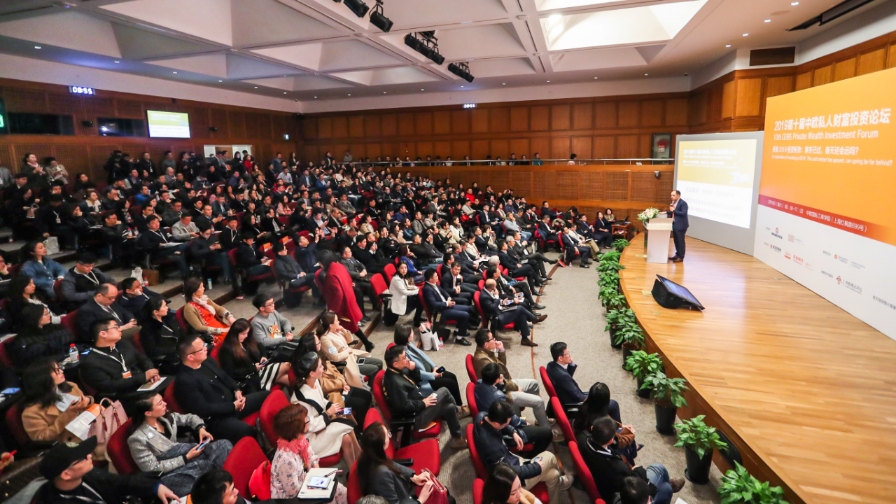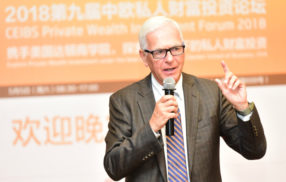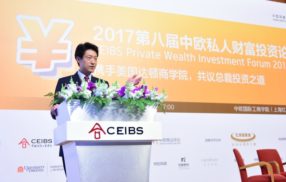
CEIBS Wealth Forum: Technology Offers New Investment Opportunities Amid US-China Trade Worries, Uncertain Economic Outlook
By Ni Tao
The past year was a tough year for the Chinese economy. Downward macroeconomic pressure continued to depress growth, causing the world’s second largest economy to slow to its lowest growth rate in decades.
What’s worse, an escalating tariff war with the United States appeared to have morphed into an all-out battle on fronts including technology and competition for talent.
Whether the country can overcome domestic adversity and withstand external shocks were questions occupying the minds of speakers at the 2019 CEIBS-Darden Private Wealth Investment Forum, co-hosted by the China-Europe International Business School and University of Virginia Darden School of Business.
US-China Trade Negotiations a ’15-Round Boxing Match’
Reflecting on his prediction last year about the trade war being “a 15-round boxing match,” Nick Sargen, chief economist and senior investment advisor at Fort Washington Investment Advisors, reiterated his viewpoint that there is “no quick solution,” in spite of the recent lull and growing swell of optimism on both sides of eventually reaching a trade truce.
Sargen, who is also a lecturer at Darden, said a string of the Trump administration’s earlier policies like tax cuts and deregulation extended the longest U.S. stock market boom in history, but the positive impact of tax reductions has started to taper off.
The tumble of U.S. stock indexes last December sent jitters through the market, spooking investors and raising expectations that a bear run was around the corner.
The quick rebound of stocks thereafter has restored some confidence to the market, Sargen said, dispelling what he called “misplaced” worries about a recession.
What Sargen said U.S. investors do need to be concerned about is a scenario where corporate profit margins shrink from record levels, in addition to slowing corporate earnings from U.S. multinationals abroad.
Instead of sounding skeptical about the economic outlook in 2019, Sargen ended his speech on a note of optimism — with caveats. On the one hand, “we will have increased volatility, but that does not mean a bear market.”
On the other, chances are that the U.S. and China will reach a trade truce, he said, but nobody knows if it will put an end to all their disputes.
Chinese Rally Sparks Cautious Optimism
While investors are cheering a recent Chinese stock market rally and expressing relief that “the worst may already be behind us,” speakers at the forum called for cautious optimism, saying the hard times are far from over.
Such talk surrounding “the passing of the winter chills” can be debated, said Xu Xiaonian, professor of economics and finance at CEIBS.
Xu said the recent bull run is little more than another boom-to-bust cycle, as it isn’t rooted in the strength of economic fundamentals. He lamented that his decade-long advocacy for a long-term, value-oriented investment model has been largely spurned in favor of a “fast-in, fast out” approach bent on seeking short-term gains.
That, however, didn’t discourage him. The renowned economist has thrown his weight behind an investment strategy that he believes mirrors the shifting Chinese economic focus — to deviate from macroeconomic policy aspects to more micro-level growth segments such as corporate innovation.
One of his suggested areas to look at is innovation from Chinese tech titans like Alibaba and Huawei. Big corporations are not necessarily a pioneer in disruptive technology, he said, but their R&D processes are marked by an incremental improvement in product design and quality.
“So don’t obsess over Apple, think more about where China’s ‘Toyota’ and ‘Samsung’ might be coming from,” said Xu.
Another prime investment target would be China’s evolving startups, many of which not only have core technologies but have developed a way to capitalize on them through mass production and economies of scale.
‘There Has Never Been a Better Opportunity to Invest in Technology’
Technological innovation has been at the forefront of disrupting existing business models and changing industries from the inside out. Darden alumnus Joaquin Rodriguez Torres (MBA ’01) is a front-row witness to how technology has changed from being a mere element or process of a business to modern-day where technology businesses directly challenge the large and incumbent players in every sector.
Managing partner at Princeville Capital, which has invested in a number of Chinese tech startups as well as tech businesses in Europe and the U.S., Rodriguez Torres said there has never been a better opportunity to invest in technology.
In almost every conceivable industry, from media to retail, from travel to financial services, there is a new tech-powered challenger for an established large player.
Rodriguez Torres’ firm invested in a health care telemedicine company that moves doctor consultation into the virtual world, posing a direct alternative to expensive emergency rooms and urgent care clinics. This is just one example showing how “very large and established industries” are being disrupted to the core by technology-based business models.
“The opportunity for growth is immense,” Rodriguez Torres said.
Another trend Rodriguez Torres noted was that the old practice of simply copying the model developed in the United States to other parts of the world no longer applies, as business model are fast becoming localized.
Nonetheless, it will be very hard for public market investors to make outsized returns in technology. This is because more and more companies are choosing to stay private for longer as most of the shareholder value is generated when companies are still private, said Rodriguez Torres, who is based in Hong Kong.
He also urges technology investors to avoid common pitfalls such as the “valley bubble,” meaning investment risks that arise from many investors chasing the same investments in a single geography raising valuations beyond fair value relative to the risk of the investment. The alternative approach would be to look globally in known and familiar sectors and choose where valuations offer compelling risk versus reward.
Rodriguez Torres lavished praise on China’s vibrant tech scene and predicted that Chinese companies like Xiaomi, the electronics giant which recently launched cutting-edge 5G mobile devices, as well as Bytedance, the parent company of Tic Tock, will continued to have success in the international markets.
The rapid rise of China Inc., however, has raised a red flag in the West, particularly in the U.S., where Chinese companies are often scrutinized for theft of intellectual property — one of many sticking points in the ongoing China-U.S. trade negotiations.
The University of Virginia Darden School of Business prepares responsible global leaders through unparalleled transformational learning experiences. Darden’s graduate degree programs (MBA, MSBA and Ph.D.) and Executive Education & Lifelong Learning programs offered by the Darden School Foundation set the stage for a lifetime of career advancement and impact. Darden’s top-ranked faculty, renowned for teaching excellence, inspires and shapes modern business leadership worldwide through research, thought leadership and business publishing. Darden has Grounds in Charlottesville, Virginia, and the Washington, D.C., area and a global community that includes 18,000 alumni in 90 countries. Darden was established in 1955 at the University of Virginia, a top public university founded by Thomas Jefferson in 1819 in Charlottesville, Virginia.
Press Contact
Molly Mitchell
Associate Director of Content Marketing and Social Media
Darden School of Business
University of Virginia
MitchellM@darden.virginia.edu






